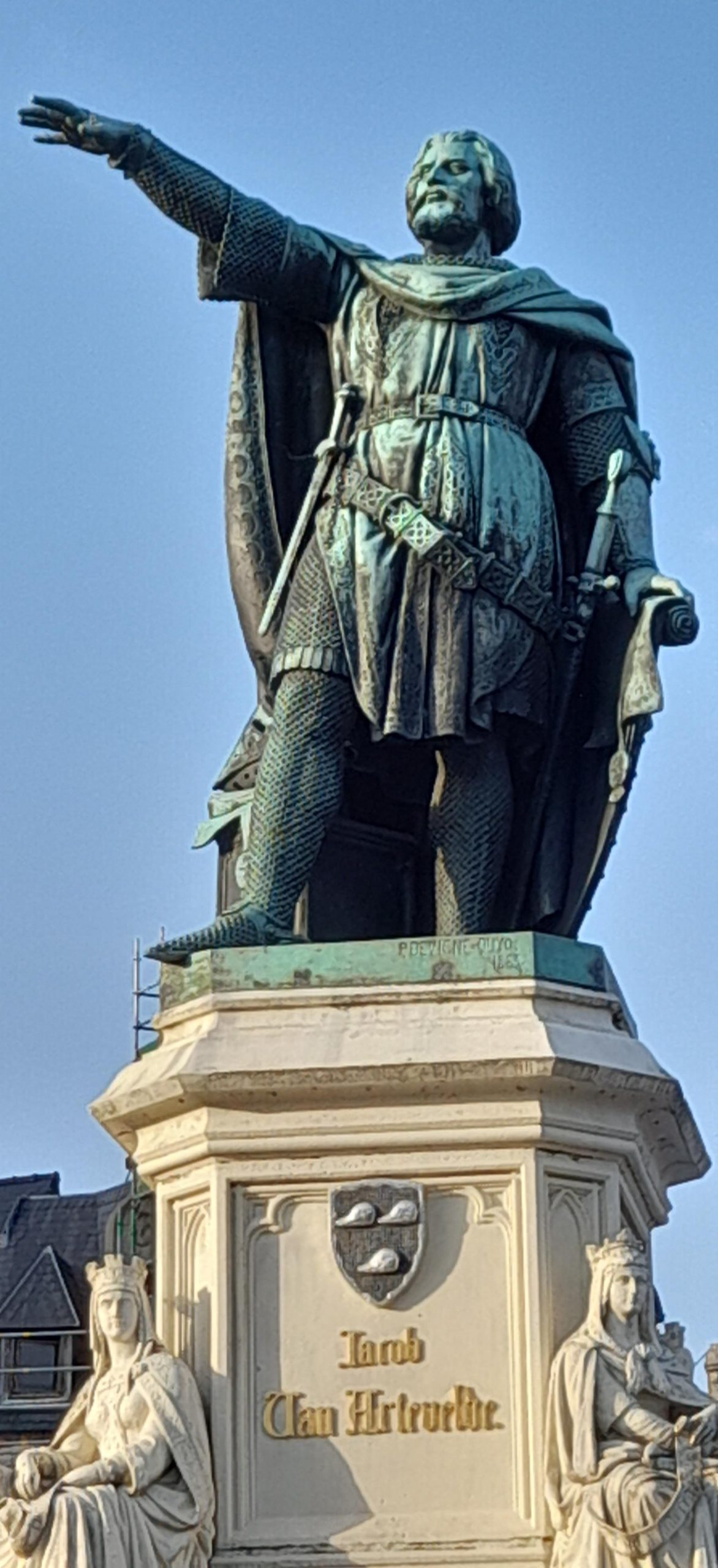The BBC conducted a poll at the time of the Millennium, to find out who Britons thought were the top 100 Britons of all time. Oliver Cromwell earned a place in the top ten. He was, after all, the only commoner to have been Head of State in the United Kingdom. Although we Brits like to think that the Civil War of the mid-17th century was the first social revolution of its kind, there had been others in Europe before it, and there had been commoners acting as Head of State.
I think that some periods of English history are complicated, but when I listened to the guides in Ghent and Bruges trying to explain the politics of medieval Flanders, I realised that Belgium has the edge when it comes to complicated history.
Supposedly owing allegiance to France, Flanders was in chaos in the 1300s. There was a Count of Flanders, but by the 1320s, the citizens of the main towns were virtually self-governing. Alas, the urban population was in conflict with the rural population. And then the Count tried to implement a new tax… Farmers, led by Nicholaas Zannekin, staged a successful revolt and ruled, after a fashion, for five years. Their enforcement was as ruthlessly violent as that of any aristocrat. They even opposed the rulings of the Church and were excommunicated. The important trading town of Ghent opposed the rural insurrection, and when the city’s weavers rose up in support, they were defeated and fined. A merchant called Jacob van Artevelde collected the money.
France eventually intervened to defeat the rebellious farmers and reinstate the Count of Flanders. But, French control meant that England would no longer trade with Flanders, which was a disaster for the wool trade.
Jacob van Artevelde emerged on to the scene again, as chief of captains of Ghent and eventually, in 1338, of all Flanders. Initially, he worked hard to prevent famine, save jobs and reduce bureaucracy. Despite this, no one lost sight of his use of force. He was, effectively, a military dictator – a shrewd one who surrounded himself with supporters who were paid well and paid on time. Anyone who tried to support the Count had their land confiscated. Arbitrary killings were common. The Count fled.
Artevelde was then free to do a deal with England. He invited Edward III to Ghent and declared him King of France. This was something all the French-speaking Plantagenets on the English throne aspired to be (and over hundreds of years they spilled much English blood in futile attempts to fulfil their fantasy). But, I digress. Back to Artevelde… Flanders fought with England against the French, until perfidious Albion did a deal with the French, disengaged, and left Flanders to face retribution.
Artevelde had domestic problems too. He was unable to please both the weavers and the fullers who squabbled continuously. Of course, the weavers had a score or two to settle with Artevelde.
Edward III did even more to damage his friend Artevelde. He decided that he wanted to instal his son as Count of Flanders. Artevelde agreed, but the rest of Flanders didn’t want to be vassals of the English any more than they wanted to be taxed by France. In the summer of 1345, the citizens of Ghent stormed Artevelde’s house and murdered him.
So, both Zannekin and Artevelde were commoners who ruled, and Artevelde seemed to be recognised as a Head of State by the English King. Remarkable! Except that, they were both interested in making money and thwarting the French king. The exercise of money and power makes strange bedfellows.
Much as I love the rhetoric of The Peasants’ Revolt in England in 1381, I can’t help thinking that Wat Tyler may have had to rule by force if he had seen through his beloved King’s duplicity and taken the wide-open opportunity to charge into London. Richard II (Edward III’s grandson) ruthlessly suppressed his loyal citizens who followed Wat Tyler and Jack Straw to protest about high taxes and serfdom, but the peasants had lynched tax collectors and other officials on their way to meet the king. Kill or be killed. Perhaps the altruism of preacher John Ball, the spiritual leader of the peasants, would have led England to an egalitarian golden age if they had stormed London and gained control of the levers of government, but, like so many “what ifs” in history, we will never know, we can only write speculative fiction about it.
Photo: Jacob Van Artevelde’s statue in the Friday Market Square, Ghent, Belgium. Apparently, he is pointing towards England. He is celebrated today for rebelling against France and restoring the wool trade, but his friendship with England was also his downfall.
For more information, visit: the low countries The Rise and Fall of ‘Brewer of Ghent’ Jacob Van Artevelde – the low countries







